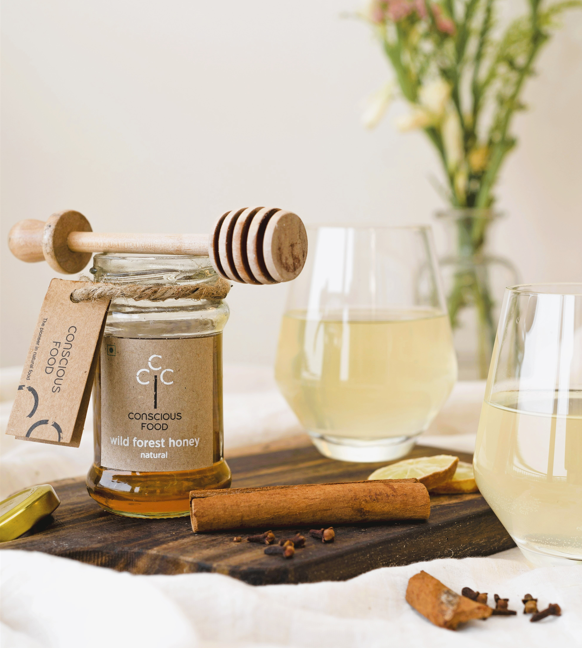When you search for organic honey online, you are most likely to come across labels like "Raw," "Pure," "Unfiltered," and "Organic." But what exactly is the difference between these? All these words have different meanings, and understanding the different types of honey can help you choose the healthiest one.
If a brand claims that its honey is pure, it means there are no added preservatives or artificial sweeteners to it (Corn or sugar syrup). The brands that produce 100% pure honey must have the purity stamp on the packaging provided by FSSAI.
However, “pure honey" does not give any information on processing the honey before packaging or how it has been collected.
Unfiltered Honey: Filtering the honey is different from straining it. Straining merely removes any large debris or dead bee particles present in the honey. Filtering, however, requires heating the honey to liquefy it and remove all the minute impurities or pollens. Thus, filtering the honey exposes it to heat, which can rob it of its nutritional value.
What is Raw and Organic Honey?
The term "Raw Honey" indicates that the honey extracted from the beehive is directly packaged and sold to the consumers without any processing or adulterations. There are so many more conditions for honey to be 100% Organic. Honey collected from the beehives of the bees that feed on only organically grown plants can be called Organic Honey. There are no traces of chemicals or pesticides inside organic honey.
How Is Organic Honey Collected?
The honey bees can fly up to 2 miles from the hive in search of flowers. This means, for the honey to be 100% organic, all the plants in the 2-mile radius from the hive should be free from chemicals and pesticides. The bees are not exposed to chemical fertilizers, pesticides, or herbicides when collecting pollen from the flowers. There are no traces of these pesticides in the honey either. When you purchase certified organic honey online or from the stores, you are getting nature's best and highest quality honey in its purest form.
What Makes Organic Honey Different From Others?

Impeccable Taste and Quality:
Raw and organic honey has a subtle aroma and flavors of flowers and wild grass in it. It tastes way richer than the industrially processed one.
Unique Texture and Colour:
One can get an idea of purity by looking at the organic honey's texture and color. Organic and Raw honey is thick and opaque. It can have a dark yellow color and can be a little cloudy as it is not exposed to heat or filtration.
No Expiry Date:
The honey that does not have any added ingredients in it will never expire! Raw and organic honey has an unlimited shelf life. However, the honey can get crystallized and hard in winters. This is because of the natural sugars present in the honey that get crystallized in cold weather. So, if you want to use it, all you have to do is place the honey container in a vessel filled with warm water, and it will go back to its original state.
As long as it is not exposed to heat, stored in a clean, hygienic bottle, and kept away from direct sunlight, pure honey will never expire.






